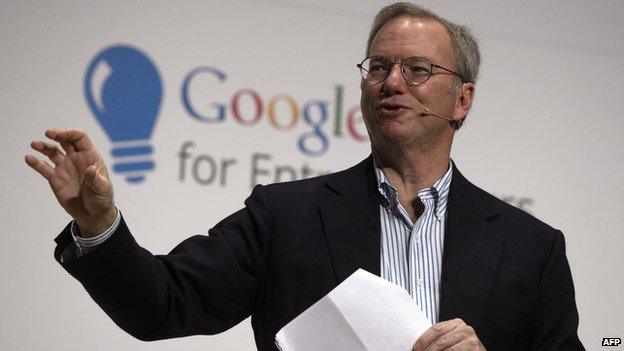Google to shut Spanish news service
- Published

Google News exits Spain after a new law would have forced to it to pay publishers for their content
Online search giant Google is shutting down its Google News service in Spain before a new intellectual property law is introduced.
Google will shut the service on 16 December before the law comes into effect in January, the firm said.
The law allows Spanish publications to charge services like Google News if their content is shown on the site.
But Google has argued against the ruling, saying that it makes no money from its search-based service.
"It's with real sadness that on 16 December we'll remove Spanish publishers from Google News, and close Google News in Spain," said Richard Gingras, head of Google News in a blog post, external on Wednesday.
He went on to add that the law which would allow Spanish publishers to charge Google "for showing even the smallest snippet from their publications" was not sustainable.
"Google News itself makes no money (we do not show any advertising on the site)," he said.
Google versus newspapers
Mr Gingras also pointed out that publishers can choose whether or not they want their articles to appear in Google News.
"The vast majority choose to be included for very good reason. Google News creates real value for these publications by driving people to their websites, which in turn helps generate advertising revenues," he said.
The Spanish legislation, nicknamed the "Google Tax", did not specify how much the tech giant would have to pay publishers.
Global newspaper publishers have long argued that services such as Google News infringe on their copyright by creating an online selection of headlines.
Spanish journalist Miguel Anxo Murado argued that being able to access the news for free undermined the value of the information.
"It is not just because of the newspapers closing... it's also a matter of principle," he told BBC World Service radio.
"The idea that news comes for free sends the wrong message... news is very valuable and costly. Good information comes at a price."
German experience
Google started asking publishers for their consent to summarise their content after Germany revised its copyright laws in 2013, which would have required Google to make payments.
Nevertheless, some large German publishers have found Google's ability to push traffic to websites difficult to do without.
In November, Germany's biggest news publisher, Axel Springer, scrapped a move to block Google from running snippets of articles from its newspapers, saying that the experiment had caused traffic to its sites to plunge.
The firm had sought to restrict Google's use of news from four of its top-selling brands: welt.de, computerbild.de, sportbild.de and autobild.de.
Axel Springer's chief executive Mathias Doepfner said his company would have "shot ourselves out of the market" if it had continued with its demands for the US firm to pay licensing fees.

Analysis: Jane Wakefield, BBC Technology Reporter
Google News shutting in Spain raises a host of questions about the future of the search giant in Europe.
After Germany's experience, some now wonder if Spain may also come to regret its Google Tax, which requires news aggregators such as Google News to pay a fee to Spanish publications.
More widely the tense relationship that Google has with the European Union is starting to raise eyebrows.
Google is really under the microscope at the EU. A long-running investigation into whether its search business was anti-competitive has failed to reach agreement despite Google offering several amendments to how search results appear.
Its privacy policy is also under investigation and last year the 'right to be forgotten' law saw it and other search engines forced to remove links that individuals felt were inaccurate or irrelevant.
Some experts are starting to ask whether the search giant's patience with the European Union is beginning to run out.
That raises the question about whether we will increasingly see a two-tier system with the Google that Europeans can access becoming increasingly different to Google in the US.

- Published10 December 2014
- Published8 December 2014

- Published20 October 2014
